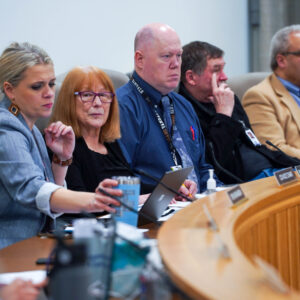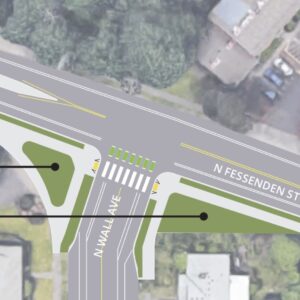The House Climate Bill that is set for a vote this Friday could help fill a transportation investment pot that states could put toward bike projects.
The American Clean Energy and Security Act (H.R. 2454) would raise money from polluters that go over their allowed emissions levels, an amount estimated to be $70 billion by 2010. Earlier this week, the House agreed that 10% of that money would go directly to states to use for a variety of transportation projects — including “bicycle facilities”.
Here’s the bill language:
Sec. 5319: Bicycle Facilities
A project to provide access for bicycles to public transportation facilities, to provide shelters and parking facilities for bicycles in or around public transportation facilities, or to install equipment for transporting bicycles on public transportation vehicles
In a statement about the agreement released yesterday, Rep. Henry Waxman, Chair of the House Committee on Energy and Commerce and chief sponsor of the climate bill said:
“Transportation accounts for nearly one-third of our global warming pollution. We will be requiring states and metropolitan areas to plan for reducing their global warming pollution from transportation, and this provision will help them reach their goals.”
And Rep. Jim Oberstar, the man pushing a transportation bill of his own, said:
“I commend Chairman Waxman for working with me to ensure that a portion of allowances are available for projects that will expand options for public transportation, bicycling, walking, and other green transportation alternatives for our citizens.”
Tyler Frisbee, a legislative aide for Rep. Earl Blumenauer says that the 10% for transportation scheme comes right from the CLEAN-TEA bill Blumenauer worked on earlier this year.
In addition to the 10% for state transportation projects, the climate bill also includes the CMAQ grant program (the Congestion Mitigation and Air Quality improvement program, administered by the Federal Highway Administration) which has been a reliable source for bike-related projects and programs in the past.
There is no change to the CMAQ program in this new bill, but according to Ms. Frisbee in Blumenauer’s office, it’s safe to assume that with a much more bike-friendly administration, bike projects could garner a larger portion of CMAQ funds than they have in the past.







Thanks for reading.
BikePortland has served this community with independent community journalism since 2005. We rely on subscriptions from readers like you to survive. Your financial support is vital in keeping this valuable resource alive and well.
Please subscribe today to strengthen and expand our work.
Here Read:
+ The Case Against Carbon Trading / Transnational Institute:
–”…Citigroup’s Peter Atherton confessed that the European Union’s Emission Trading Scheme had ‘done nothing to curb emissions.’ He admitted,‘Prices up, emissions up, profits up …’ Who wins and loses? Coal and nuclear-based generators–biggest winners. Hedge funds and energy traders–even bigger winners. Losers … Consumers!”
In other words, Power Companies simply pass on the tax to consumers—without ever reducing their emissions!!!
+ New climate change legislation overlooks a major GHG source: industrial ag / Grist Magazine:
–”The bill fails to address greenhouse gas emission reductions from agriculture, factory farms, and animal manure whatsoever–and even goes the extra mile to specifically exempt the entire sector from any type of regulation.”
“Enteric fermentation is literally the largest source of methane emissions in the entire country.”
+ EPA’s Landfill Methane Outreach Program / EPA:
–”Municipal solid waste landfills are the second largest source of human-related methane emissions in the United States.”
“At the same time, methane emissions from landfills represent a lost opportunity to capture and use a significant energy source.”
Also read:
+ Beware emissions trading, airlines stand to make billions / Mother Jones,
+ The Carbon Folly / BusinessWeek,
Rather than cap-and-trade, the Govt. should set caps on GreenHouse Gas emission, then provide 0-interest loans for companies to Go Green (when such cannot afford to).
Also Read:
+ Loophole may mean bigger, not smaller, cars / MSNBC:
–“New rules may actually encourage automakers to build behemoths.”
“Too bad the rules will discourage automakers from manufacturing the kind of small cars that the Obamaites favor and, in some cases, encourage carmakers to do exactly the opposite. That’s right: make some models bigger.”
“… the legislation, while forcing a significant boost in fuel economy, has loopholes big enough to drive a truck through.”
“But say a big SUV misses its target by one mile per gallon. A carmaker could just make the vehicle a bit larger, allowing it to hit an easier fuel economy target.”
“‘The system doesn’t do anything to encourage smaller vehicles,’ … And even if gasoline prices rise again and prompt consumers to look for smaller cars, he says, the new rules give automakers less incentive to sell more of them.
+ From Bagels to Coal Fires: An Unorthodox Economist Keeps Pushing for Change / NY Times, 2007:
–”… the abundance of underground coal fires in abandoned mines and other places that not only waste coal but contribute mightily to worldwide carbon dioxide emissions.”
”… underground fires in China alone contribute as much CO2 to the atmosphere each year as all the cars and light trucks in the U.S.”
Meanwhile, the Climate Change Bill grants BILLIONS in subsidies to Clean Coal.
Here Read:
+ The Illusion of Clean Coal / The Economist:
+ Trouble in store–Carbon capture and storage / The Economist:
+ The Dirty Truth About Clean Coal / BusinessWeek,
+ King Coal’s Latest Con–Clean Coal is Not Clean / CommonDreams
Sounds like a deal with the devil.
While I am happy for more funding for bike/ped/transit, its similar to the car maker who refuses to fix a known defect,knowing statistically,its cheaper to pay off a few lawsuits than do a recall. Polluters will figure out the tipping point, and if its cheaper to continue polluting,hoping not to get caught, and if we do, we pay a relatively small fine.
I am sure Rep Blumenauers goals are noble,however I see this as a total loser.
This is great news and a monumental bill. I know it is easy to criticize cap and trade, but this thing has been in the works for well over a decade. Also unlike Europe, US companies and regulators have decades of experience dealing with cap and trade.
Carbon is a different animal, but this policy approach has had some successes in the past notably phasing out lead gasoline and reducing acid rain levels in the east.
Also to counter the first post, there are a lot of influential enviro groups working on getting this bill passed. Also here is a great piece from NRDC on cap and trade:
http://switchboard.nrdc.org/blogs/astevenson/5_reasons_why_cap_and_trade_is.html
I’d encourage the skeptics over the man-made climate change to think of the sky in Beijing.
The current consumption of dirty, noxious energy reminds me of human smoking habit.